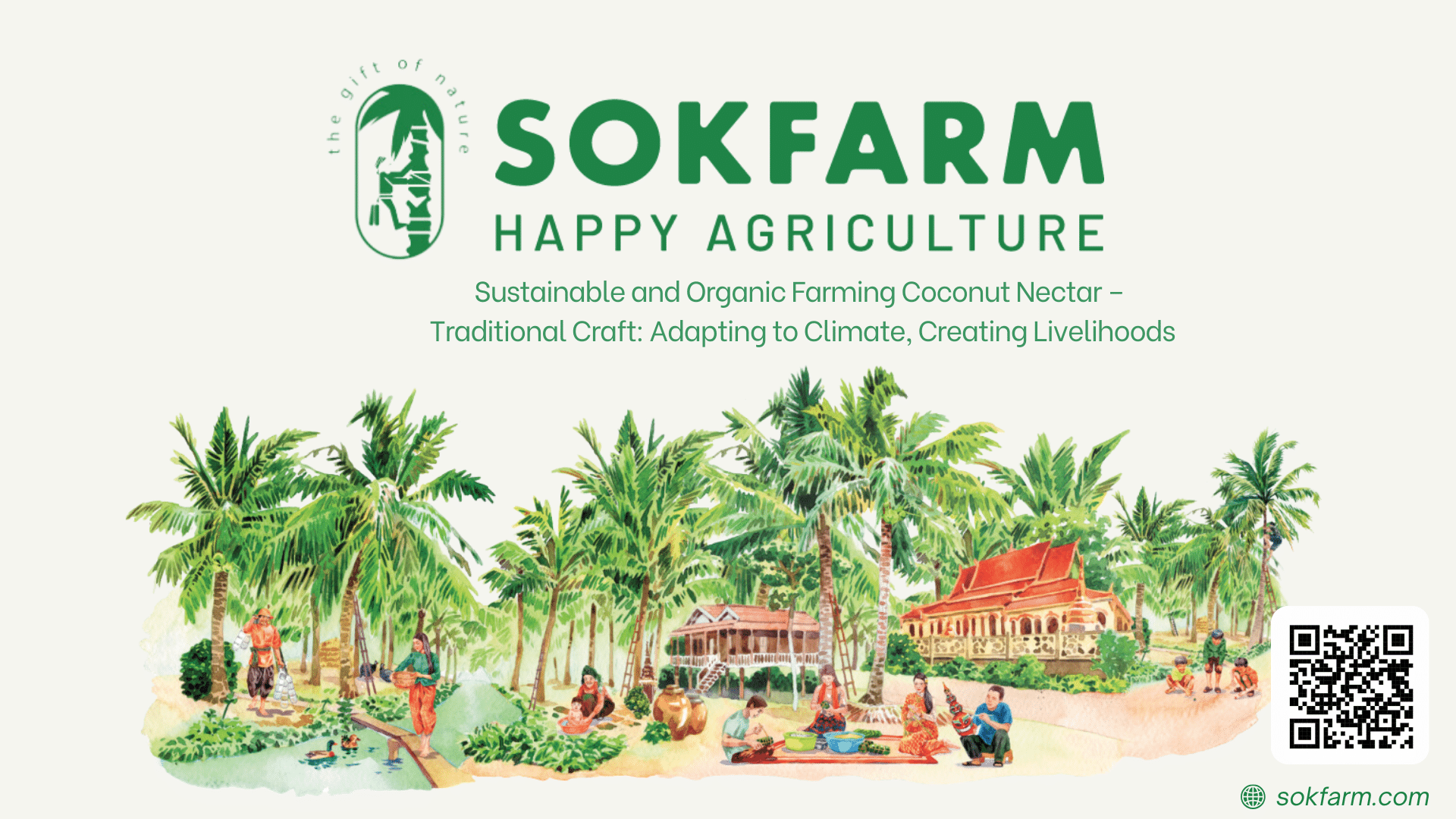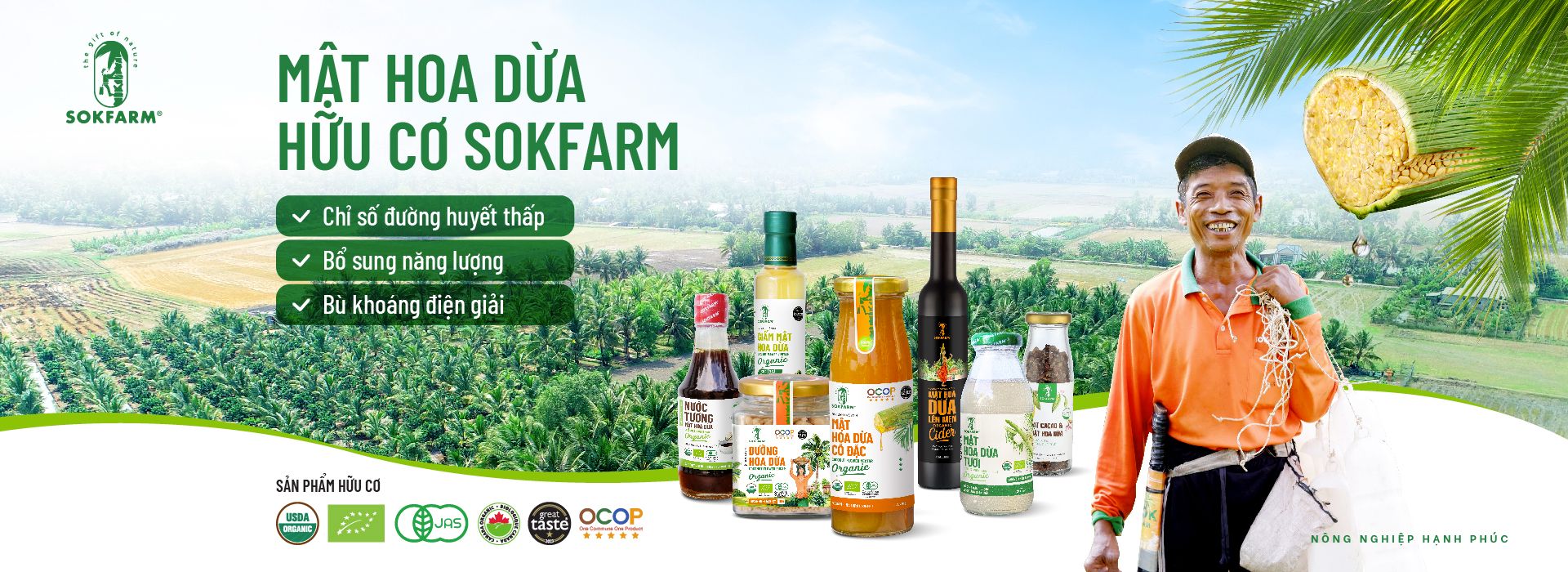

Sokfarm
Sokfarm chọn theo đuổi mô hình kinh doanh tạo ra tác động xã hội, mang lại sinh kế bền vững cho... View more
EXECUTION AND SCALEUP
A. Social business description
A1. Social mantra one-liner
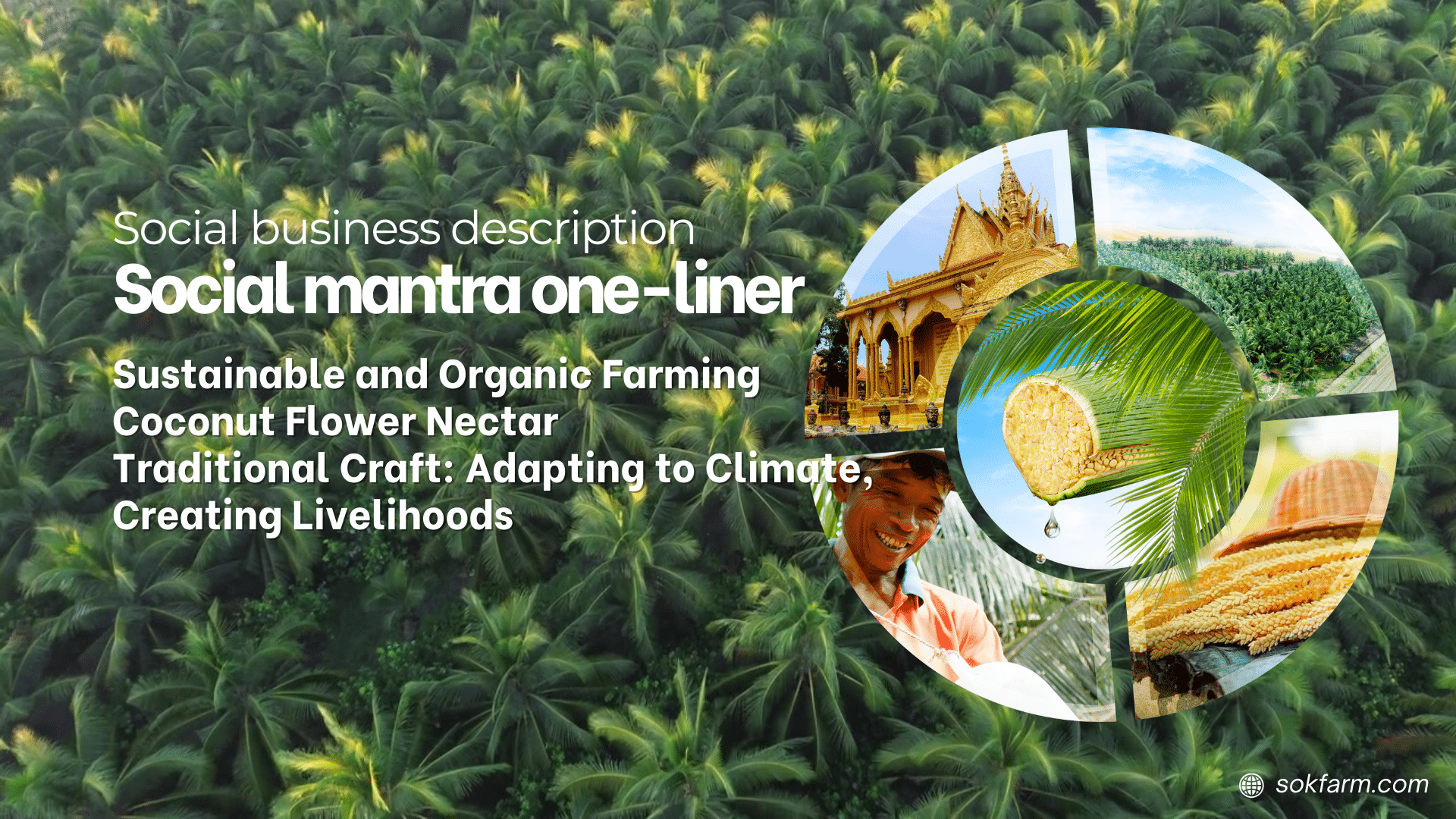
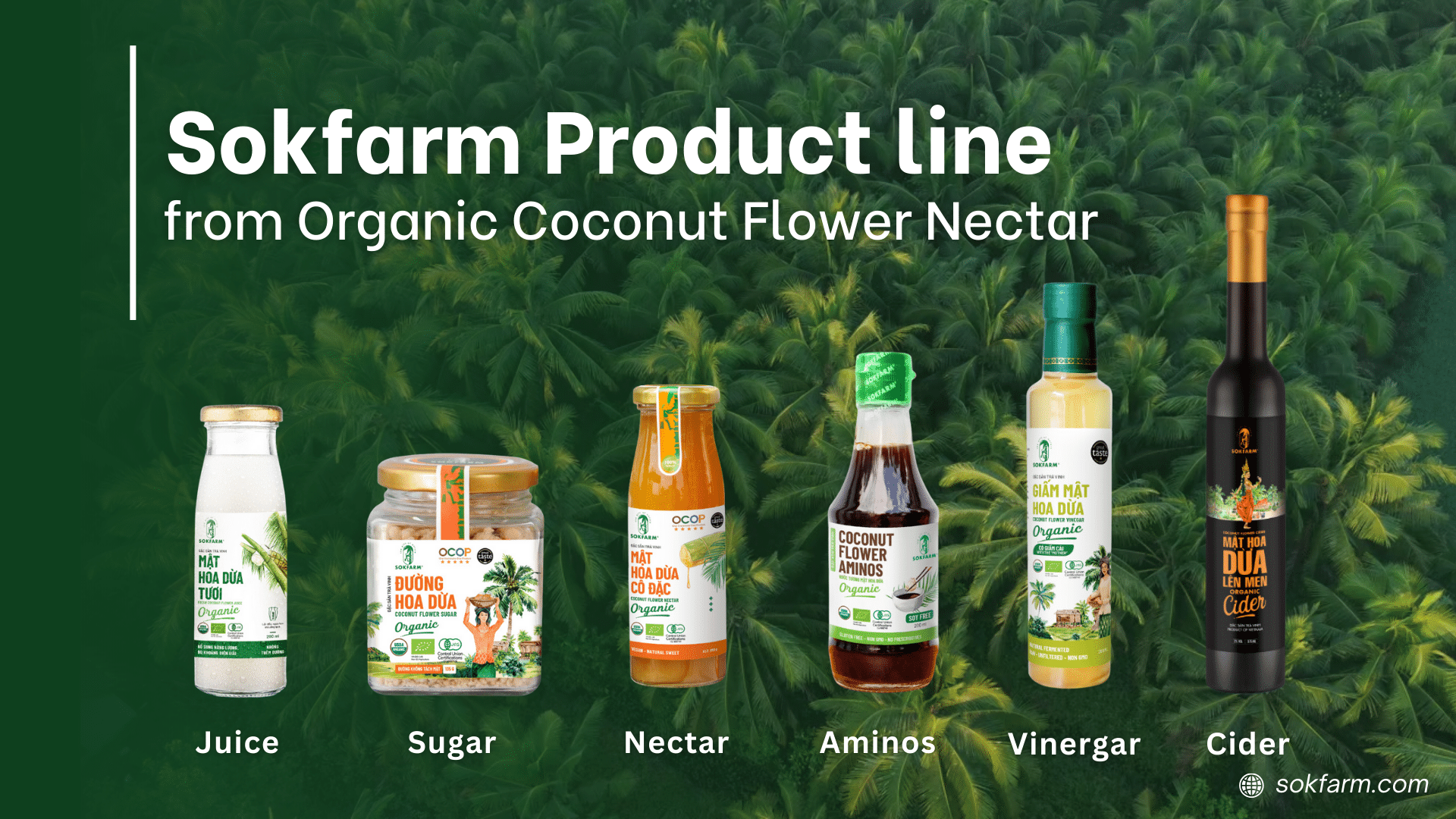
A2. Business model overview

Our business delivers economic value by creating sustainable livelihoods for the local. Sokfarm’s long-term purchasing policy for coconut nectar (5-10 years) fosters economic growth for local farmers by providing a stable income source, which increases their economic value by 3-5 times compared to selling coconuts directly.

Our business creates social value by reviving traditional crafts of the Khmer people, and empowering women and ethnic minorities. This is reflected in Sokfarm’s workforce, where 70% are women and 80% are Khmer ethnic minorities.

Sokfarm captures its social and economic values through partnerships with three key groups: farmers, local employees (likely from the Khmer ethnic minority), and customers. They target health-conscious consumers seeking natural and nutritious options, those who value sustainable practices, and cultural enthusiasts interested in preserving Khmer crafts. This focus, along with premium product positioning and community support, ensures a profitable business model.
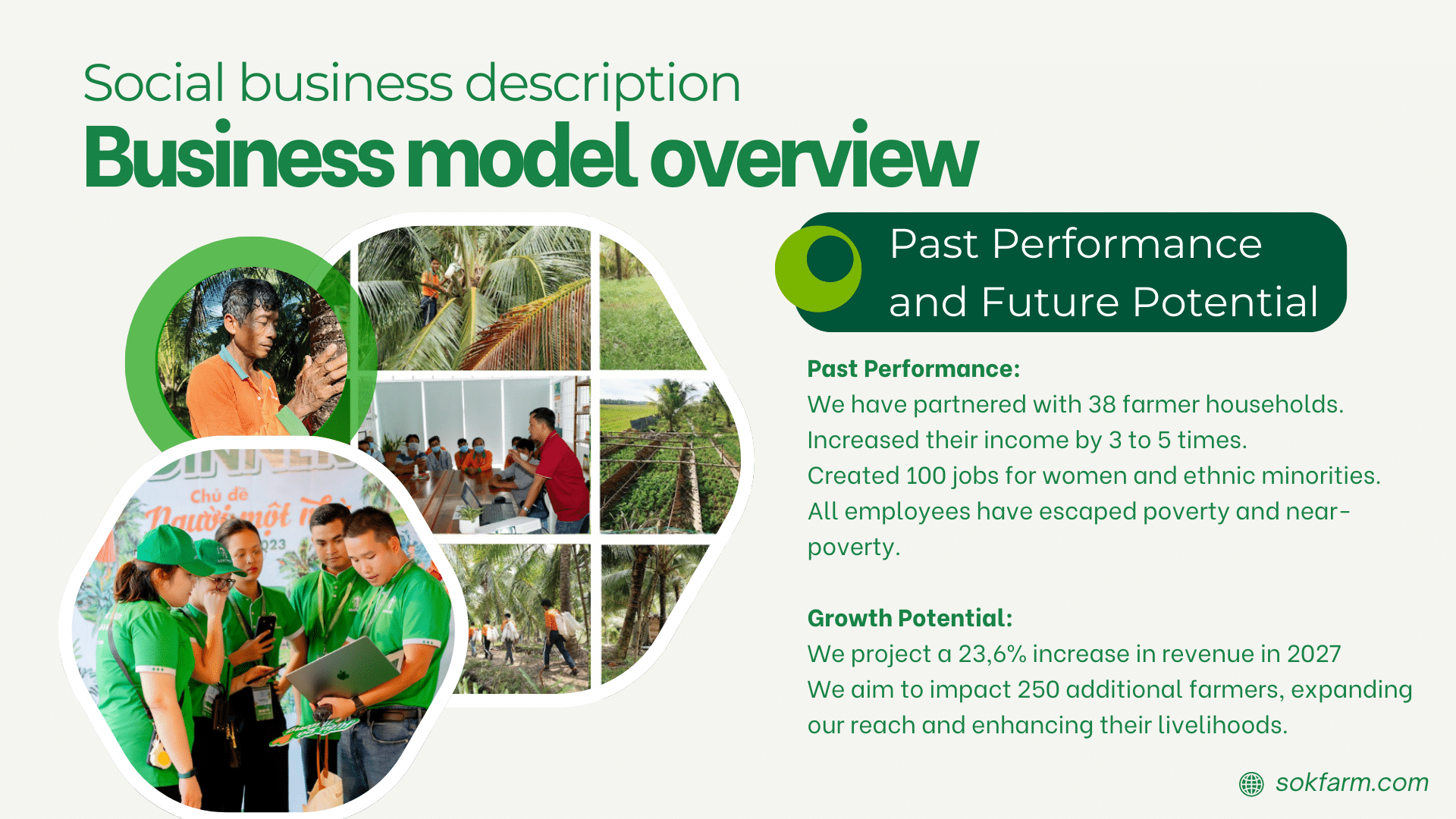
With a projected growth driven by increasing consumer demand for healthy, sustainable products and expanding market outreach to health food sectors globally, we anticipate a significant increase in profitability while positively impacting local communities through job creation and cultural preservation initiatives.
Past Performance: We’ve partnered with 38 numbers of farmer households, increased their income by 3- 5 times, and created 100 jobs for women and ethnic minorities. All employees have escaped poverty and near-poverty.
Growth Potential: With expanding market reach and new product development, we project a 23.6% increase in revenue and impacting 250 additional farmers in 2027
A3. Growth potential
A3.1 Market Overview

Source: Statista. Value of the natural sweeteners market worldwide from 2017 to 2026 (in million U.S. dollars).
In 2020, the global natural sweeteners market value reached at 29,9 billion U.S. dollars and was forecast to grow to over 39 billion U.S. dollars by 2026 with a CAGR of 6.24% from 2020 to 2026.
As a natural sweetener that can replace sugar and other artificial sweeteners, we estimate that in Vietnam, approximately 3 million people, and over 250 million people worldwide with diabetes, have a need for our product (accounting for 50% of the total number of people with diabetes).
Additionally, based on positive feedback from fitness enthusiasts, we estimate that over 80 million potential customers might use our organic product for energy supplementation (50% of the 174 million fitness club members worldwide). Given the substantial size of our target customer base, we recognize the significant market potential that Sokfarm is aiming to capture.

A3.2 Competition
- To customer:
With coconut flower nectar substitutes available such as agave nectar, date syrup, raw honey, maple syrup, or molasses, coconut flower nectar has been proven to outperform these alternatives in terms of health benefits. Compared to maple syrup and honey, coconut flower nectar has a much lower glycemic index, making it a consistently healthier option.
In particular, a standout product from Sokfarm is their coconut flower nectar soy sauce. This soy sauce is entirely processed from coconut flower nectar, with a low sodium (Na) content that is only half of that found in soybean soy sauce. Therefore, Sokfarm’s soy sauce is a better choice for individuals with hypertension. This is considered a competitive advantage for Sokfarm compared to its competitors, although it is not widely known yet.
Therefore, our Unique Selling Proposition (USP) is providing a special product tailored for customers with conditions like diabetes and hypertension, while still ensuring delicious flavor.
- To social impact
As pioneers in organic products from coconut flower nectar, we have supported local farmers, created outlets for coconut-growing regions facing challenges, and mitigated saline intrusion in Tra Vinh – a feat that other products cannot achieve.
Currently, we are facing indirect competition from substitutes but have no direct competitors. This stems from our strength as the second-largest source of raw materials nationwide, and we are establishing sustainable relationships with partners to prevent new manufacturers from entering with similar product models. Secondly, we hold patents for our modern technology processes to extract and produce coconut flower nectar. Lastly, our social impact story helps distinguish our mission prominently among other competitors.
A3.3 Window of Opportunity
Our products are new and cater to a niche market at present. However, with the growing demand for organic products and evidence of revenue growth in recent years, Sokfarm’s market growth rate and share are optimistic and expected to continue increasing in the coming years. Currently, Sokfarm’s market presence is relatively low, so we aim to enhance our visibility through robust marketing campaigns. We predict this will be relatively favorable because, according to the AC Nielsen report on organic food consumption trends, 86% of consumers in Vietnam prioritize choosing organic products for their daily meals due to their safety, high nutritional value, and taste. Therefore, these consumers are likely to switch to using our organic products.
Beyond Vietnam, Sokfarm targets exports to developed markets with high demand for organic products, such as North America (capturing 38.4% of the organic ingredients market).
B. Resources and capabilities to execute
B1. Key capitals
Human Capital: The company values its workforce’s knowledge, skills, experience, and health.
- Employees: The company employs over 100 individuals.
- Farmers: Currently, there are 35+ farmers partnered with the company, with projections to reach 500 partnerships by 2030 and over 1000 by 2035.
- Quality of Employees by Education Level: Employees hold bachelor’s and master’s degrees in food technology, engineering, and business administration.
- Average Experience: Employees have an average of 5 years of working experience.
- Ethnic Diversity: The workforce includes skilled Khmer ethnic workers, especially in the traditional coconut flower field.
Social Capital: The network of relationships, trust, and shared values between people and groups.
- B2B Distributor/Sales Partner: The company collaborates with over 33 B2B distributors and sales partners, serving 400+ stores across Vietnam.
- Customers: The group, known for “Delicious meals with coconut nectar,” now boasts over 7,800 members.
- Manufacturer & Restaurant: Key stakeholders in the company’s network.
- Media: Sokfarm’s journey in the coconut nectar industry has been featured by 20+ TV stations and in over 40 articles.
- Governance: The company ensures compliance with regulations and standards
Intellectual Capital: Includes patents, copyrights, trademarks, and proprietary knowledge.
- Certifications and Awards: Sokfarm holds international certifications for organic farming practices such as USDA, JAS, and EU organic certifications. The company has also received prestigious awards including the OCOP 5-star award and Great Taste award.
- Product Development: Sokfarm innovates with vacuum concentration technology operating at a low boiling point of 55°C. This preserves the nutritional value and natural flavor of coconut flower nectar, ensuring superior product quality.
- Farming Techniques: Sokfarm utilizes traditional coconut flower massage techniques unique to the Khmer ethnic minority region of Tra Vinh.
Manufactured Capital: Includes buildings, machinery, factories, vehicles, and technology infrastructure.
- Factory and Production: Sokfarm operates a 500m2 manufacturing plant equipped with modern machinery and technology. The efficient production processes enable Sokfarm to transform 80 tons of fresh coconut nectar into 20 tons of high-quality finished products monthly, totaling 240 tons annually.
- Facility Standards: The manufacturing facility adheres to international standards, including ISO22000:2018, ensuring quality and safety in production.
Financial Capital: Refers to financial assets readily available for investment or spending.
- Fund Sponsored: Sokfarm benefits from the Triple I Impact Fund, amounting to 1 million in support for initiatives and growth.
- Recurring Revenue and Profit: The company generates recurring revenue and profits, sustaining its financial health and growth trajectory.
Natural Capital
- Farm and Plantations: Sokfarm manages 20 hectares of coconut plantations in Tra Vinh.
- Water Filtration and Regulation: Healthy ecosystems with diverse plant life are vital in filtering water and regulating water flow.
B2. Business traction
B2.1 Past performance
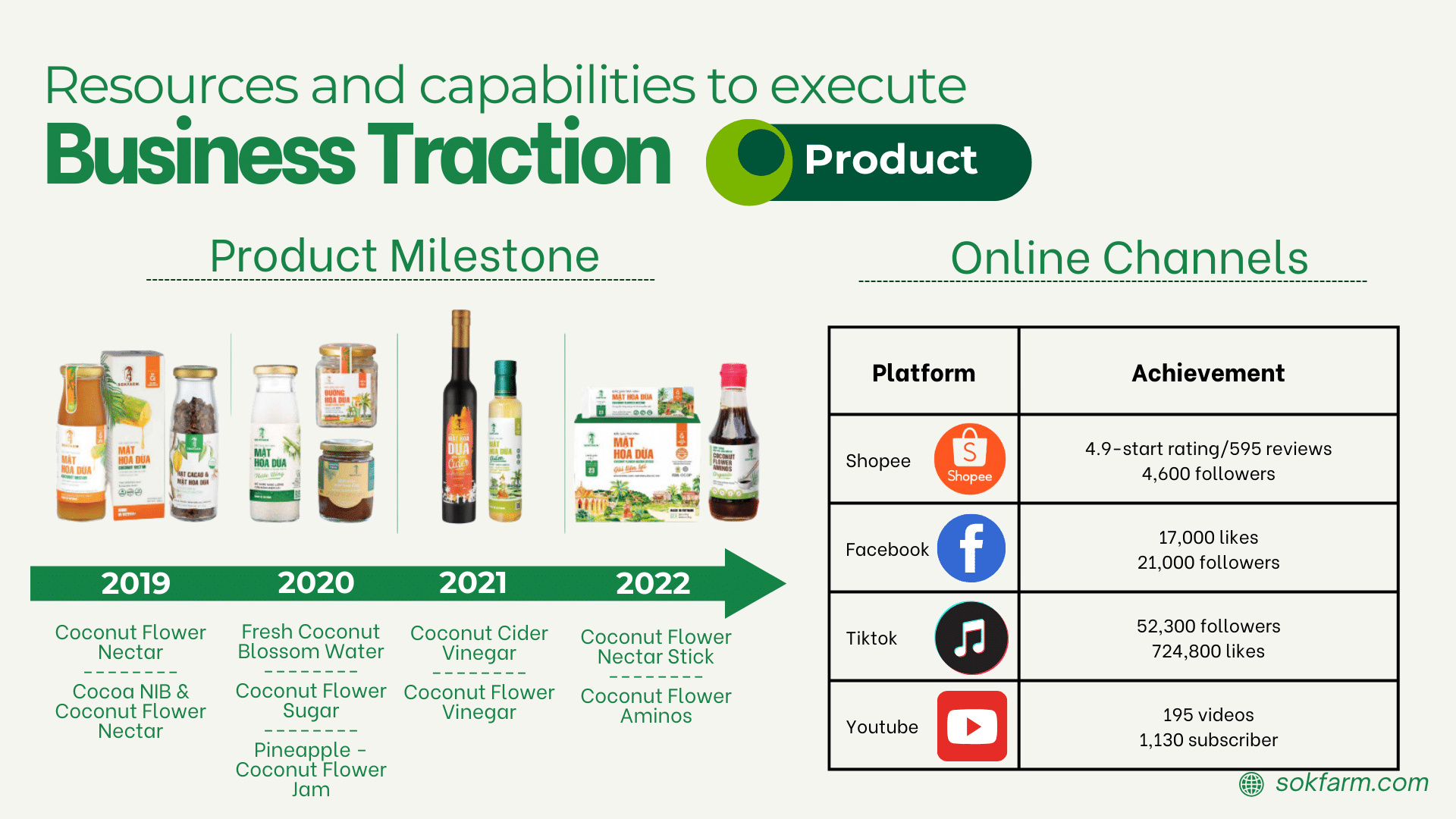
In terms of product: Over the past years, our product launch milestones are presented here. We have also recorded positive figures on social platforms including Shopee, Facebook, TikTok, and YouTube. Our raw product segment aimed at distributors has successfully entered and been applied in various industries.
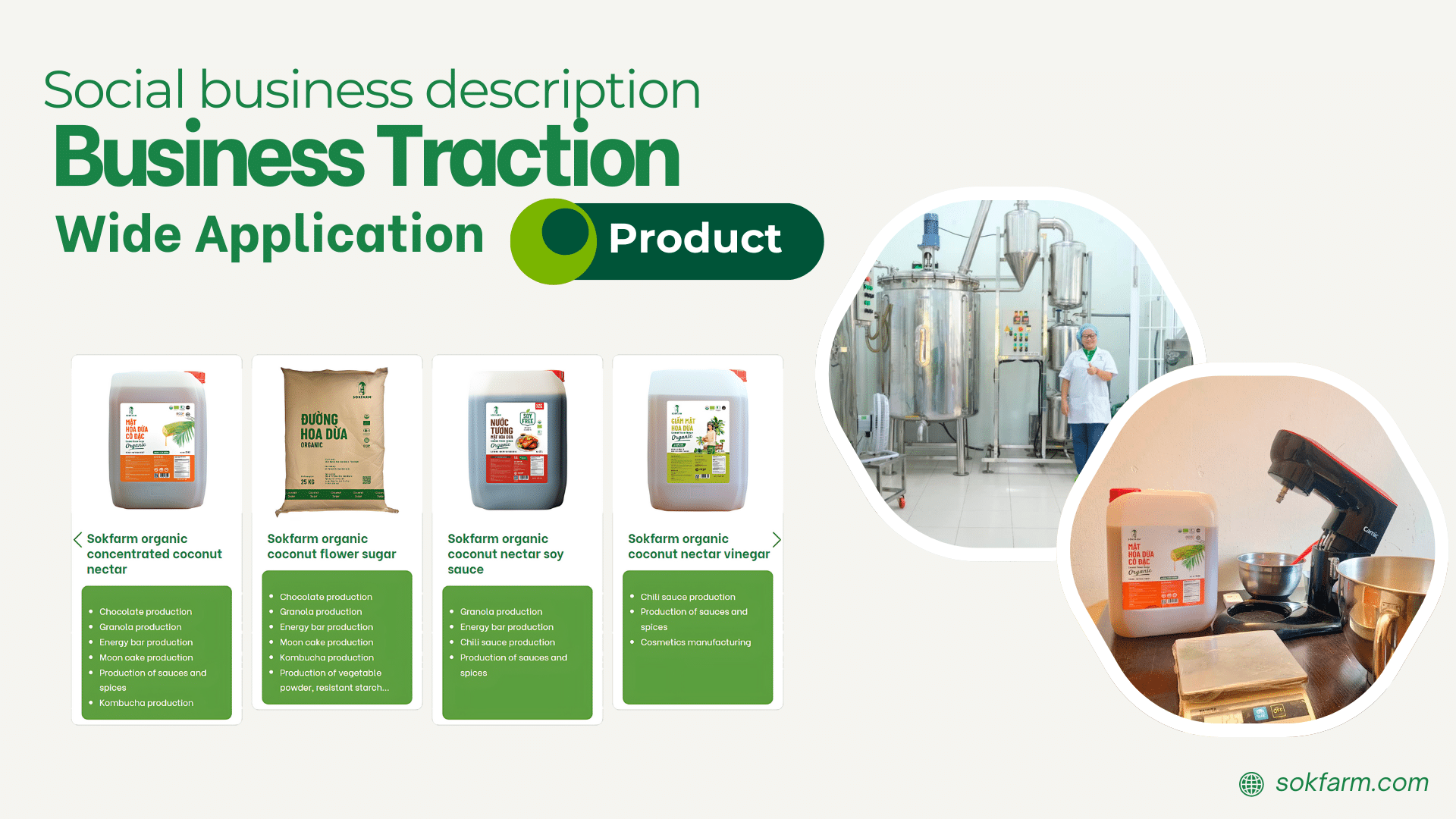
In terms of business: Sokfarm has gone through the following milestones. Specifically, regarding the financial situation, the growth rate over the years has been 38.38%, with revenue in 2023 reaching 18 billion VND and other metrics presented as follows. We have also successfully penetrated new markets and officially exported to the Netherlands, Japan, the United States, Germany, and Australia.
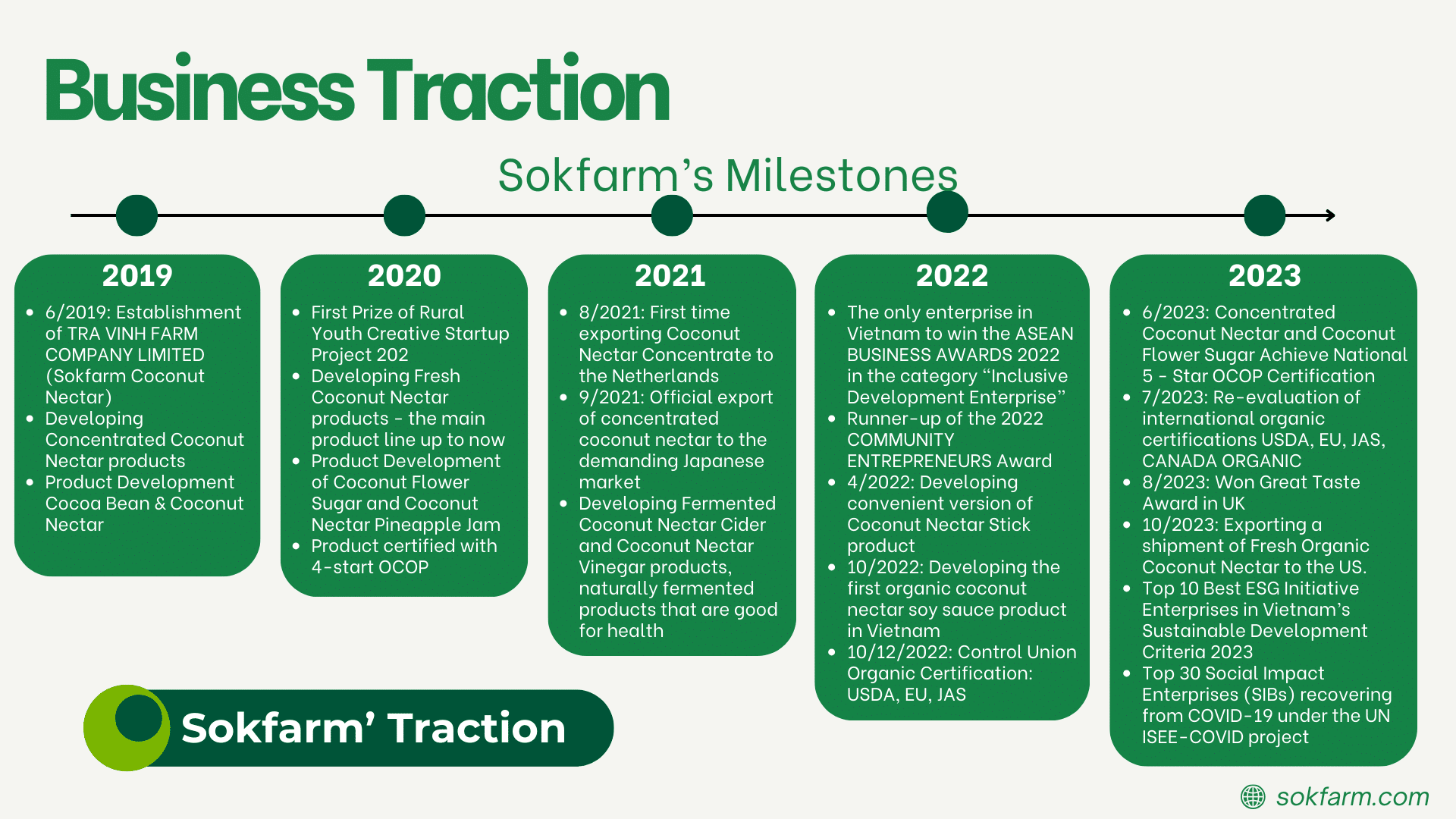
Sokfarm’s Traction:
Founded in 2019, after more than 4 years of operation, Sokfarm’s current business situation is as follows:
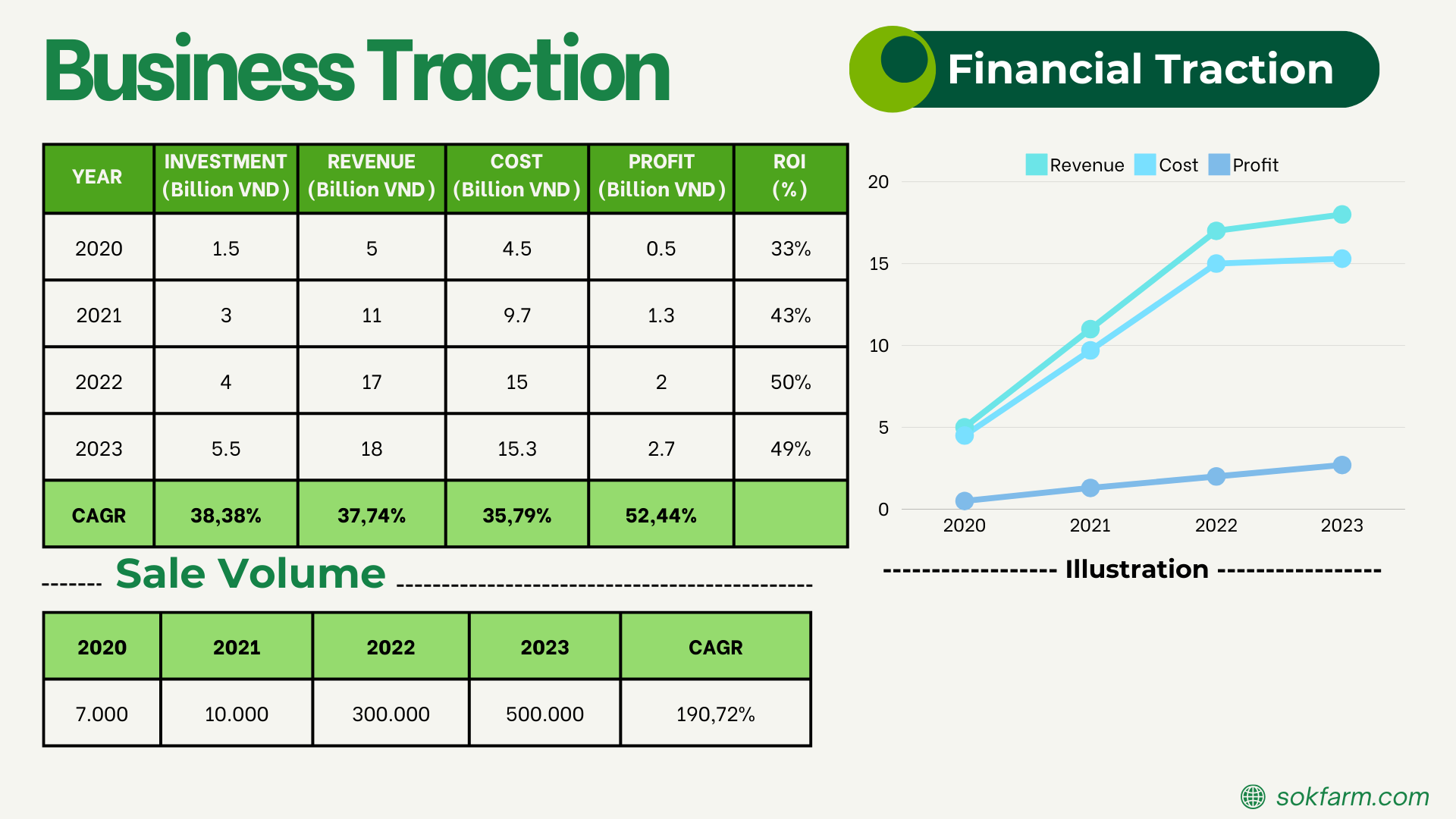
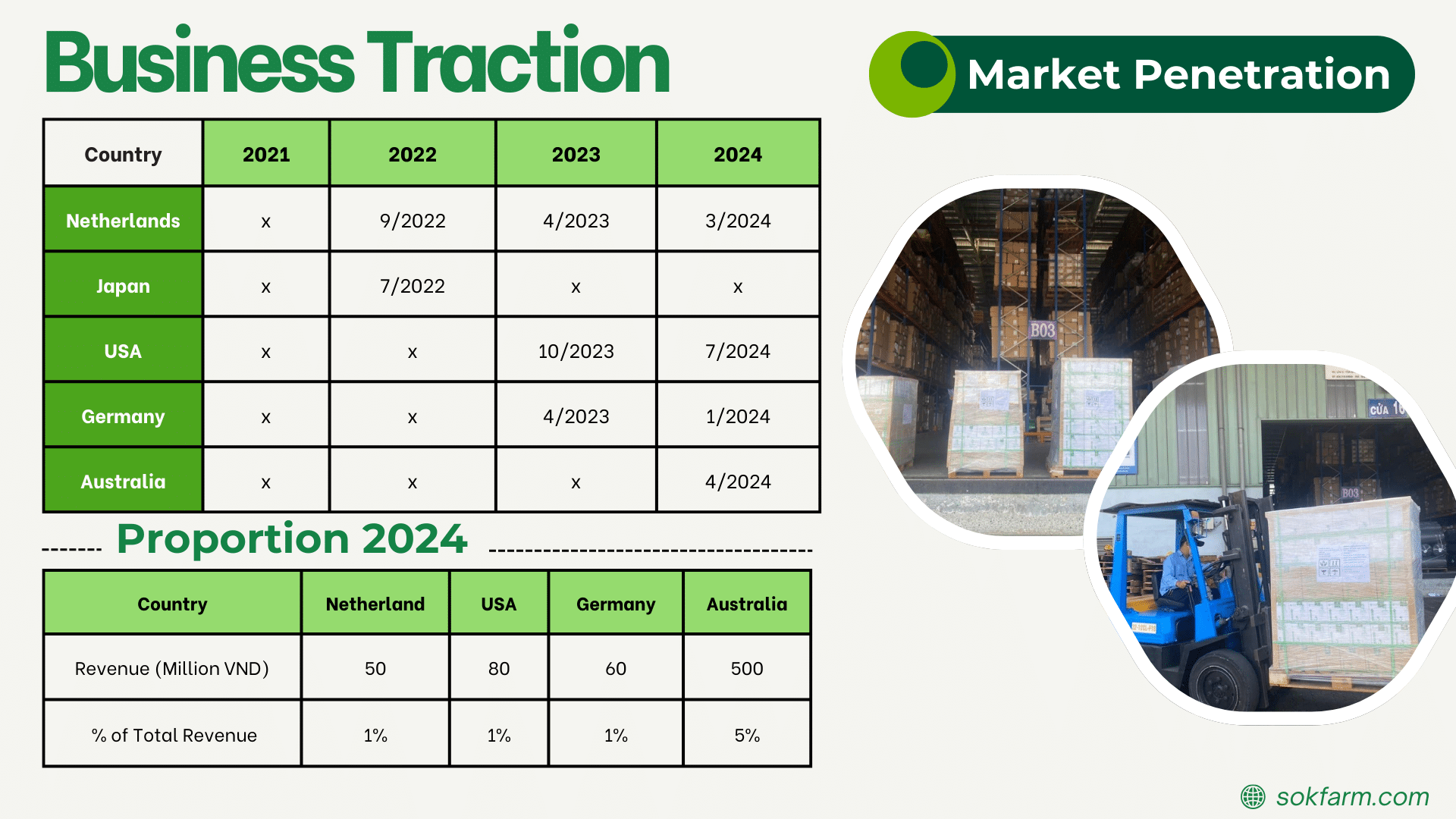
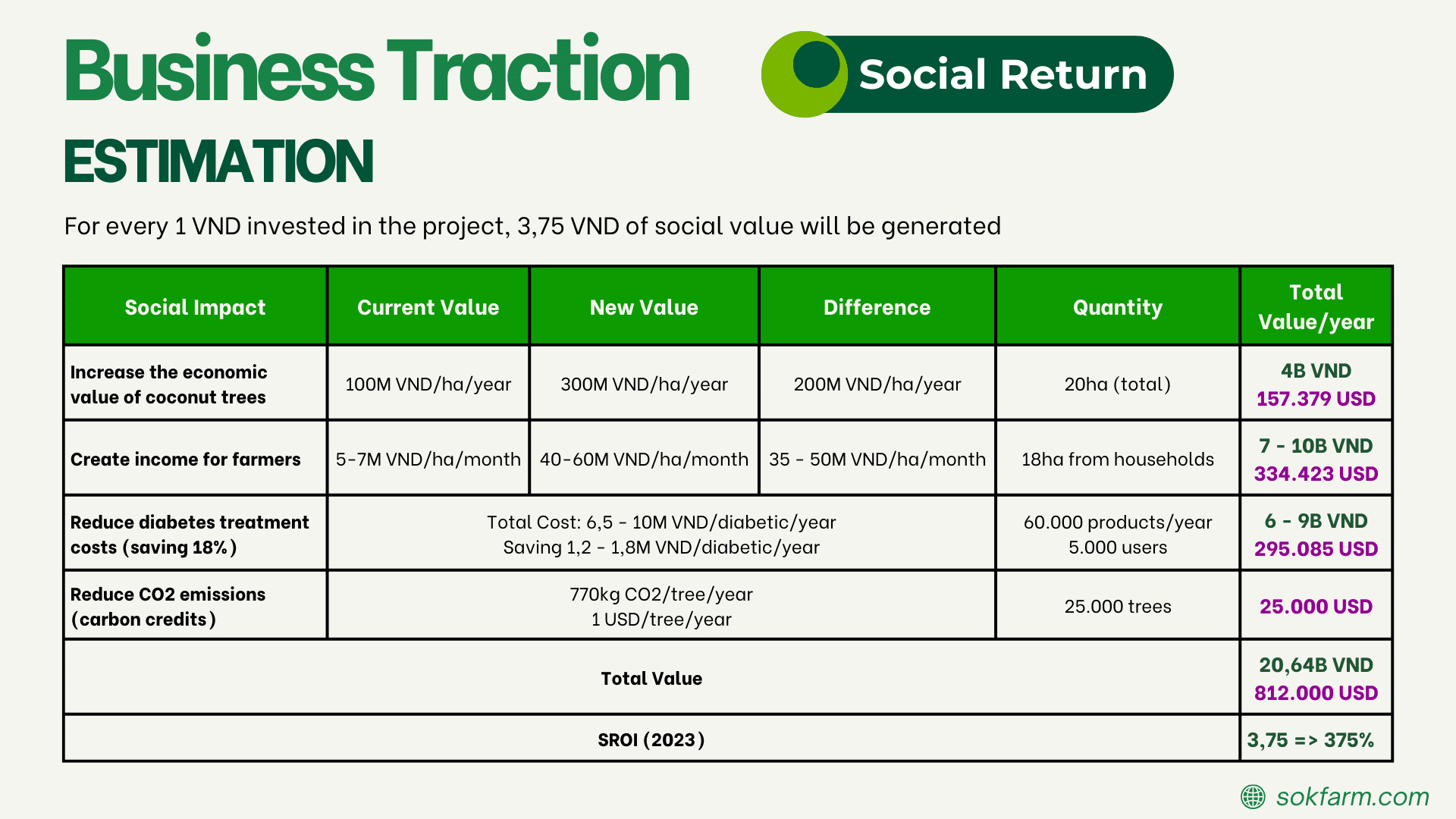
In terms of social impact: We also estimate the Social Value that Sokfarm can create totally is about 812.000 USD and three times the amount we invested. For the next 3 years, you can refer to the financial forecast table below for our figures
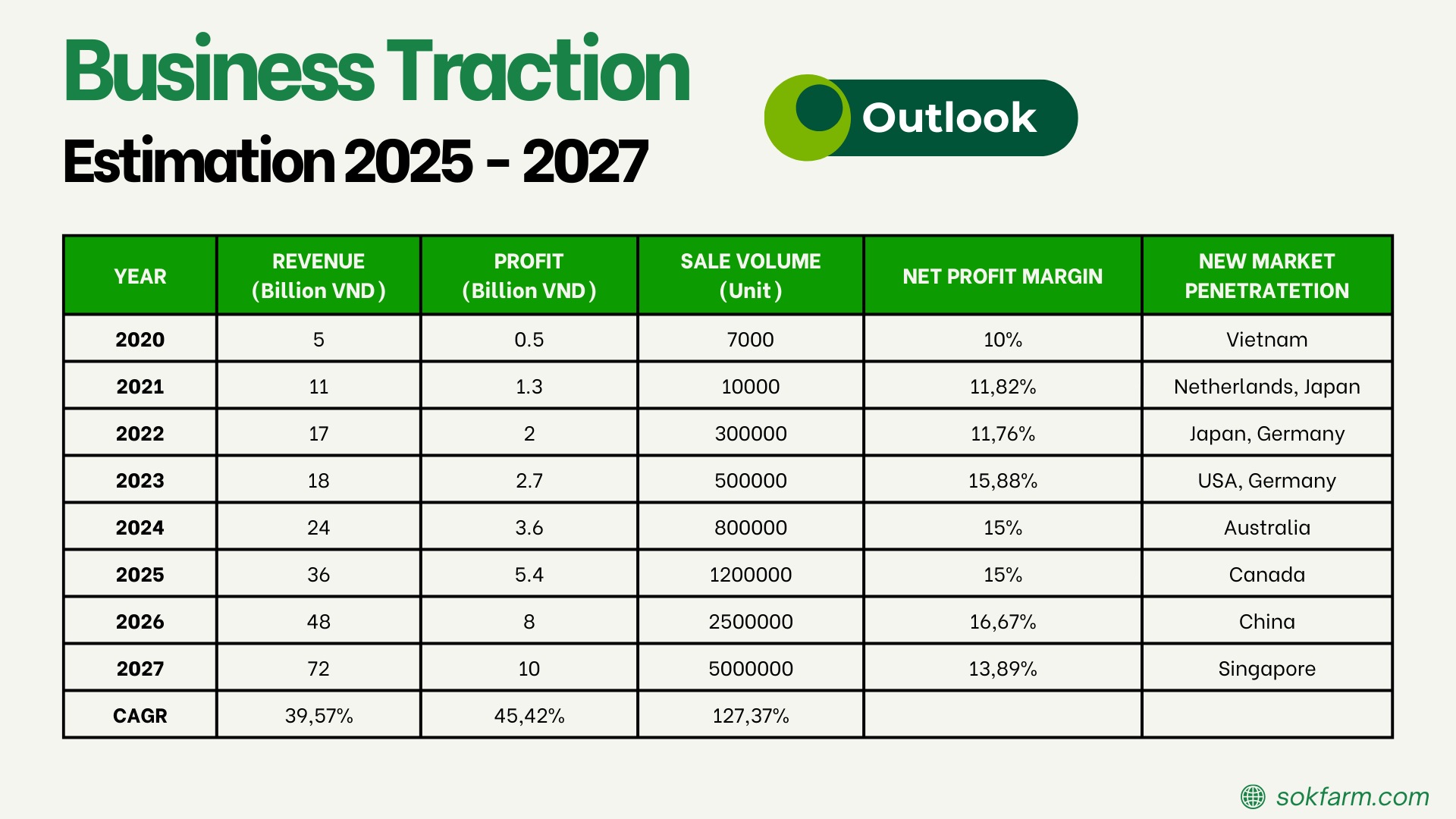
B3. Risk management
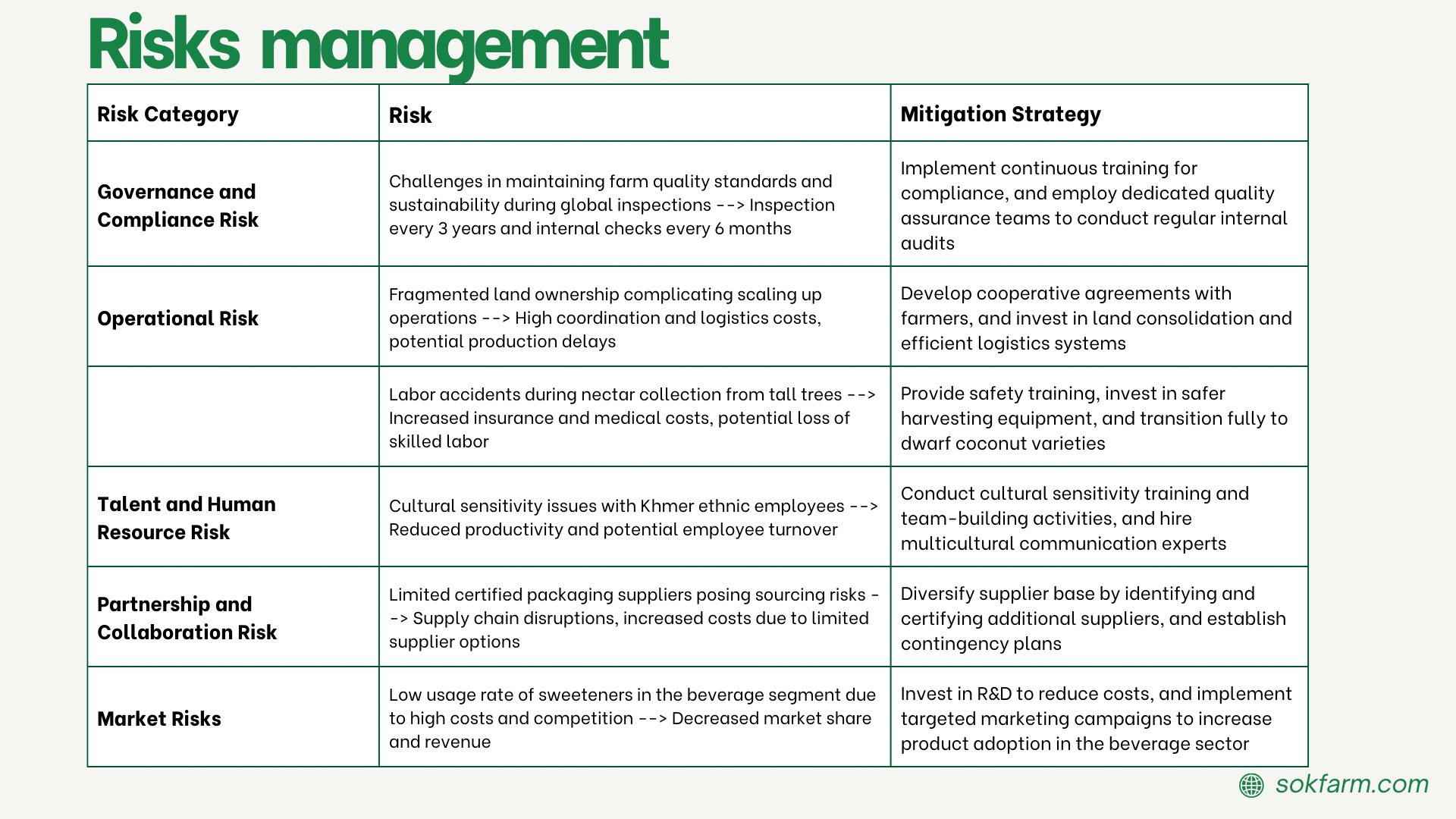
Sokfarm has identified several key risks and developed comprehensive mitigation strategies. One major challenge is governance and compliance, where maintaining farm quality standards and sustainability during global inspections requires rigorous efforts such as continuous training and regular internal audits. Operational risks include dealing with fragmented land ownership, which complicates scaling operations, and addressing safety concerns from labor accidents during nectar collection. To mitigate these, Sokfarm plans to establish cooperative agreements with farmers and invest in safety equipment and training programs. Additionally, cultural sensitivity issues among Khmer ethnic employees pose human resource risks, prompting initiatives in cultural sensitivity training and team-building activities. Partnership risks arise from reliance on limited certified packaging suppliers, necessitating efforts to diversify the supplier base and certify additional suppliers. Finally, market risks, such as low adoption of sweeteners due to cost and competition, will be addressed through strategic investments in research, development, and targeted marketing to bolster product acceptance and market competitiveness.
C. ESG performance
C1. Overall impacts on the society and environment
1. ESG Risk Analysis

- Environment:
Greenhouse Gas Emissions: Sokfarm’s reliance on conventional electricity for production processes might contribute to greenhouse gas emissions, impacting climate change and its associated environmental consequences.
Water Resource Depletion: While Sokfarm prioritizes water conservation, even surface water use can strain local resources and disrupt ecosystems if not meticulously managed. Overuse can impact water tables, affecting surrounding communities and agricultural productivity.
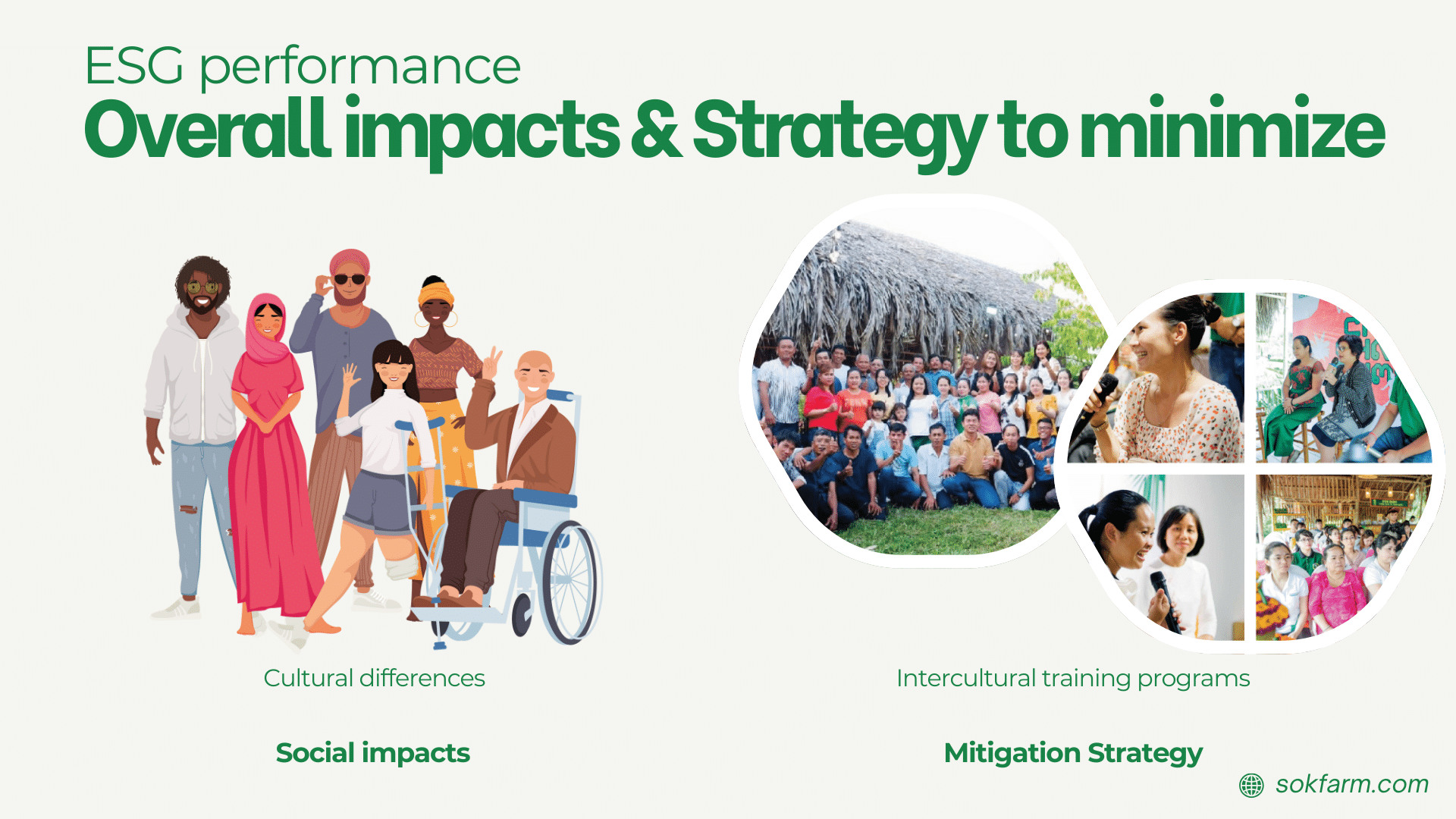
- Social:
Cultural Differences: While a diverse workforce is a positive aspect, the high concentration of Khmer people among Sokfarm’s employees can lead to cultural misunderstandings and communication barriers. This can affect team dynamics and overall work efficiency if not actively addressed through cultural sensitivity training and promoting open communication channels.
2. Strategy to minimize negative externalities
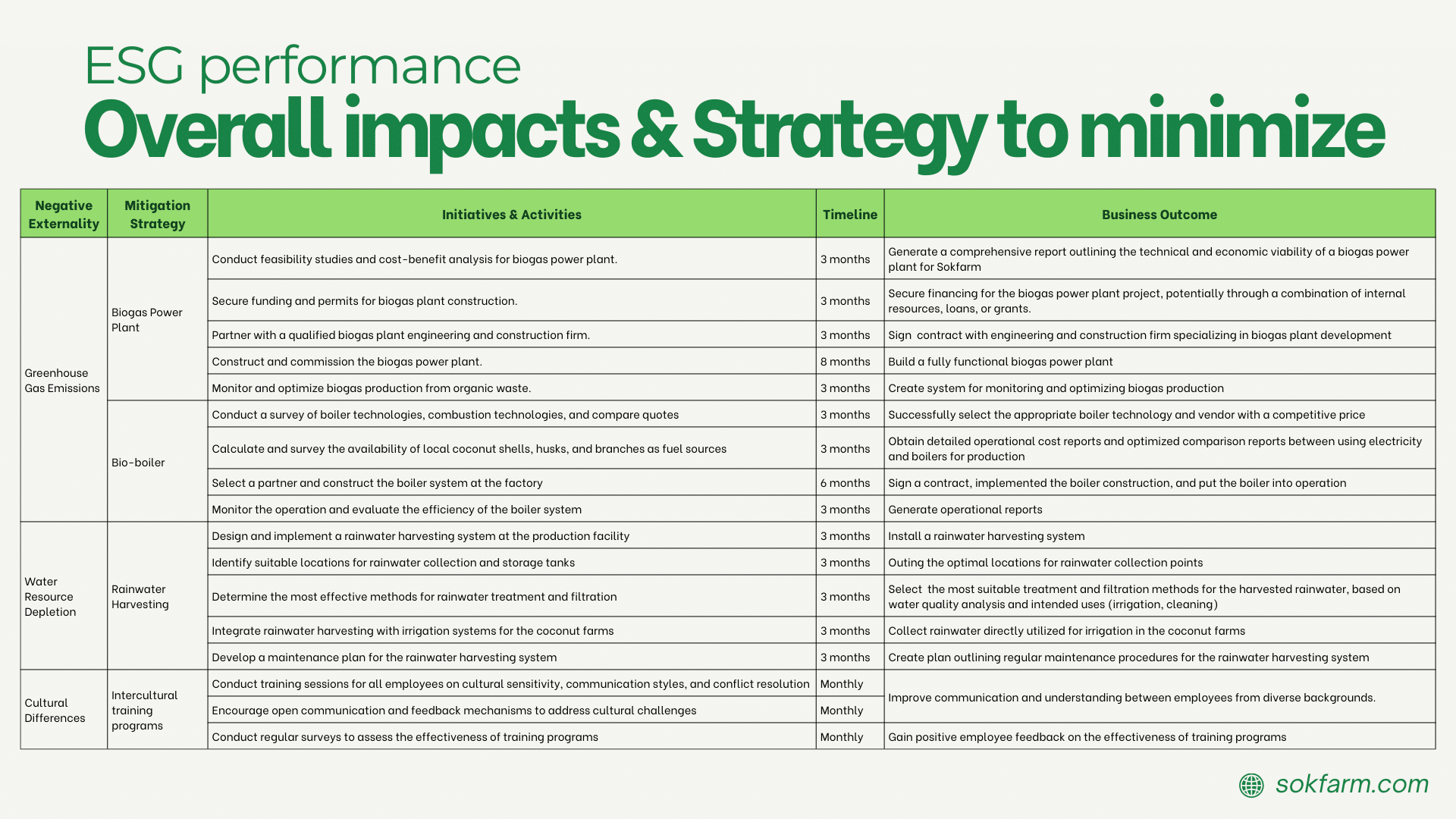
Renewable Energy:
- Investing in bio-gas power plants could significantly reduce reliance on conventional electricity and minimize greenhouse gas emissions. Instead of relying solely on external sources for bio-gas plant feedstock, Sokfarm can leverage its circular production principles. Organic waste generated throughout our operations, such as coconut husks, shells, and even food waste, can be converted into biogas to fuel the power plant. This approach not only reduces reliance on conventional electricity and minimizes greenhouse gas emissions but also elegantly closes the loop on organic waste management within Sokfarm’s circular economy model.
- Sokfarm’s commitment to circular production principles can be further strengthened by investing in a 1000kg/h bio-boiler. The bio-boiler, powered by locally sourced biomass (coconut shells and leaves), is projected to reduce Sokfarm’s electricity consumption by 50%, translating to a potential saving of 50,000 kW/month by 2025. This substantial reduction in electricity usage directly contributes to a lower carbon footprint and aligns with Sokfarm’s commitment to environmental responsibility. The bio-boiler utilizes 100 tons of coconut shells per month, totaling 1000 tons annually. This aligns with Sokfarm’s circular production approach by maximizing the use of locally available biomass resources, reducing waste, and supporting the local economy.
- Water Harvesting: Captured rainwater through harvesting systems can be used for irrigation in Sokfarm’s organic coconut farms. This reduces dependence on surface water resources, ensuring water security for both Sokfarm and the local community. The harvested rainwater can also be used for various cleaning and processing tasks within the production facility. By prioritizing rainwater over groundwater or surface water sources, Sokfarm minimizes environmental impact and further strengthens circular production model.
- Intercultural training programs: Developing intercultural training programs can equip employees with the skills to navigate cultural differences effectively, fostering a more inclusive and collaborative work environment.
3. ESG measurement framework
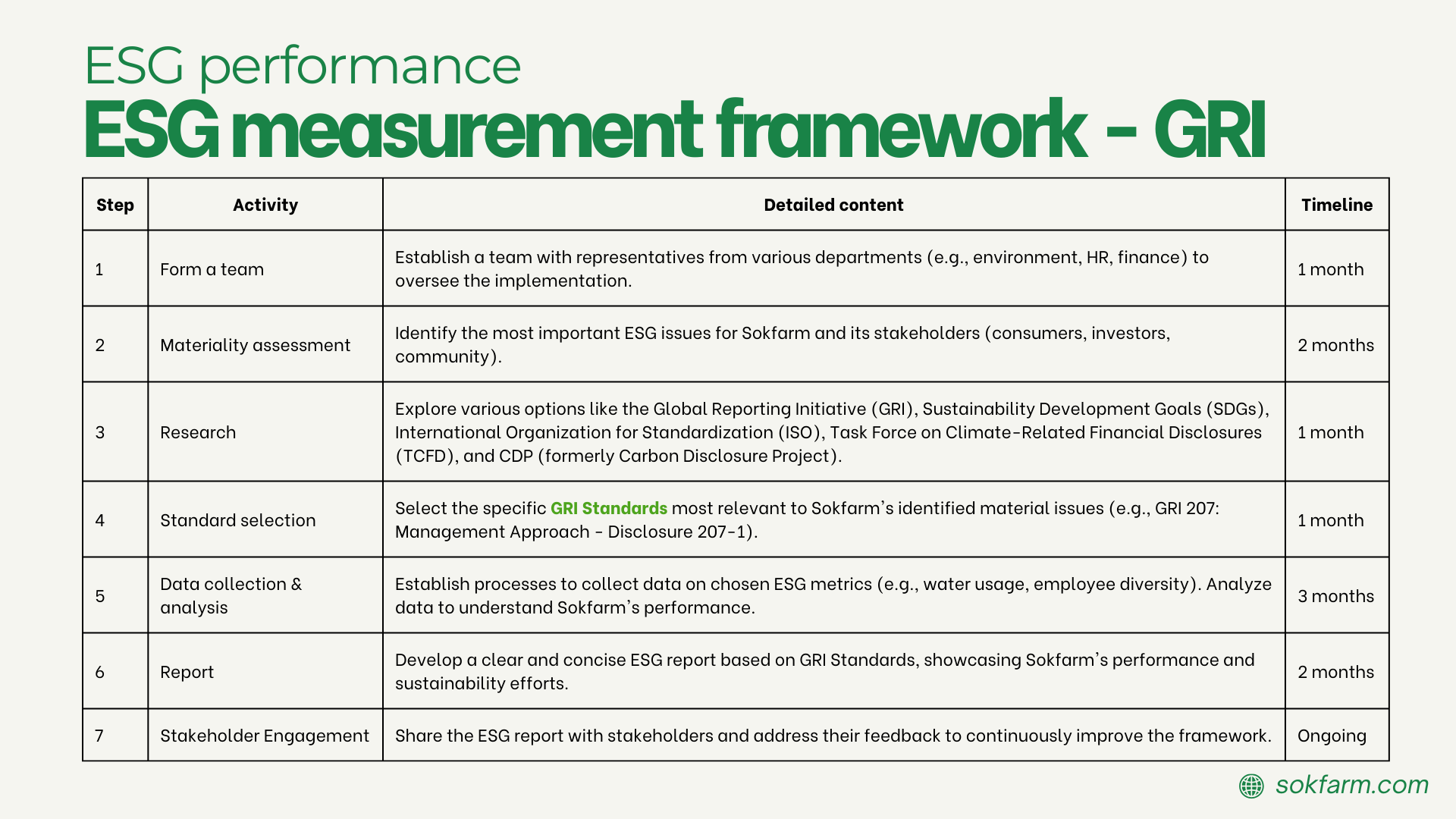
- Sokfarm’s commitment to organic farming, fair labor practices, and employee diversity extends beyond a single issue area, highlighting the need for a comprehensive ESG measurement framework. While Sokfarm likely explored various options like the Global Reporting Initiative (GRI), Sustainability Development Goals (SDGs), International Organization for Standardization (ISO), Task Force on Climate-Related Financial Disclosures (TCFD), and CDP (formerly Carbon Disclosure Project), GRI Standards emerged as the most suitable choice for several key reasons.
- GRI Standards offer a robust framework encompassing a broad range of environmental, social, and governance (ESG) aspects. This allows Sokfarm to track their performance across various metrics, providing a clear picture of their impact on organic farming practices, fair labor conditions, workforce diversity, and other sustainability areas.
- The GRI Standards framework integrates seamlessly with the UN Sustainable Development Goals (SDGs). Sokfarm can leverage relevant SDG metrics to demonstrate progress in minimizing negative externalities and contribute to a larger global sustainability agenda. This approach showcases their commitment not only to internal improvement but also to broader societal well-being.
- The GRI Standards emphasize transparency and stakeholder inclusivity. This aligns perfectly with Sokfarm’s potential desire to communicate their ESG efforts openly to various stakeholders, including consumers, investors, and local communities. This fosters trust and builds confidence in their commitment to responsible business practices.
- GRI Standards offer a modular framework that can adapt and evolve alongside Sokfarm’s ESG strategy. This flexibility allows them to prioritize metrics relevant to their current focus areas and add new metrics as their sustainability efforts expand. This ensures that the framework remains relevant and reflects their ongoing commitment to ESG best practices.
C2. Governance structure
1. Governance mechanisms
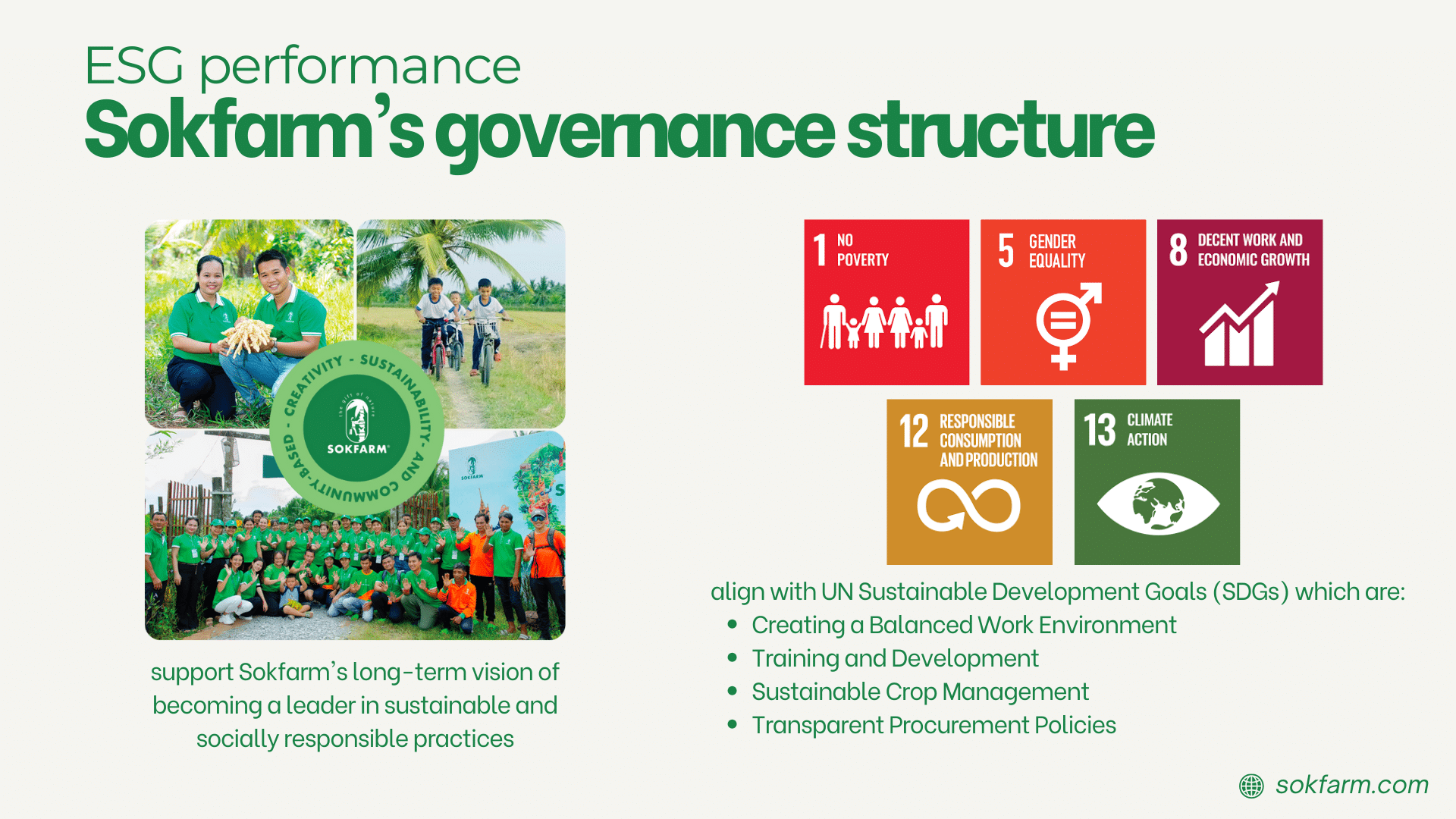
Sokfarm’s governance mechanisms are strategically designed to not only achieve immediate business goals but also to align with the company’s long-term vision of becoming a leader in sustainable and socially responsible practices. This alignment directly contributes to the UN Sustainable Development Goals (SDGs) that Sokfarm has identified as key to its mission.
Sokfarm aspires to be a “beacon of Vietnamese heritage” by honoring traditional coconut nectar collection practices of the Khmer people. This vision aligns with SDG 10: Reduced Inequalities, as it emphasizes the preservation and appreciation of cultural heritage, particularly that of a potentially marginalized ethnic group. Additionally, Sokfarm’s focus on “elevating Vietnamese products to global recognition” contributes to SDG 1: No Poverty, by promoting economic opportunities for Vietnamese farmers and businesses.
Sokfarm’s governance practices directly support this long-term vision and targeted UN SDGs:
- Creating a Balanced Work Environment: Building a fair and respectful work environment that promotes the rights of women and ethnic minorities (as stated in their governance information) aligns with SDG 5: Gender Equality, ensuring equal opportunities for all employees. This creates a diverse and inclusive workforce, fostering innovation and cultural understanding.
- Training and Development: Providing comprehensive training and career development opportunities, particularly for recent graduates, empowers employees and contributes to SDG 8: Decent Work and Economic Growth. This not only benefits the company but also enhances the overall well-being of the workforce.
- Sustainable Crop Management: Guiding farmers towards organic farming methods and efficient crop management systems aligns with SDG 13: Climate Action, by promoting environmentally responsible practices that reduce reliance on harmful chemicals and promote soil health.
- Transparent Procurement Policies: Sokfarm’s long-term procurement policies with farmers not only ensure a stable supply chain but also contribute to SDG 1: No Poverty, by providing farmers with predictable income and increasing their economic value. This aligns with their vision of fostering a “happy community.” These transparent policies also contribute to SDG 12: Responsible Consumption and Production, by promoting fair and sustainable practices throughout the supply chain.
2. Preparation for investment and due diligence
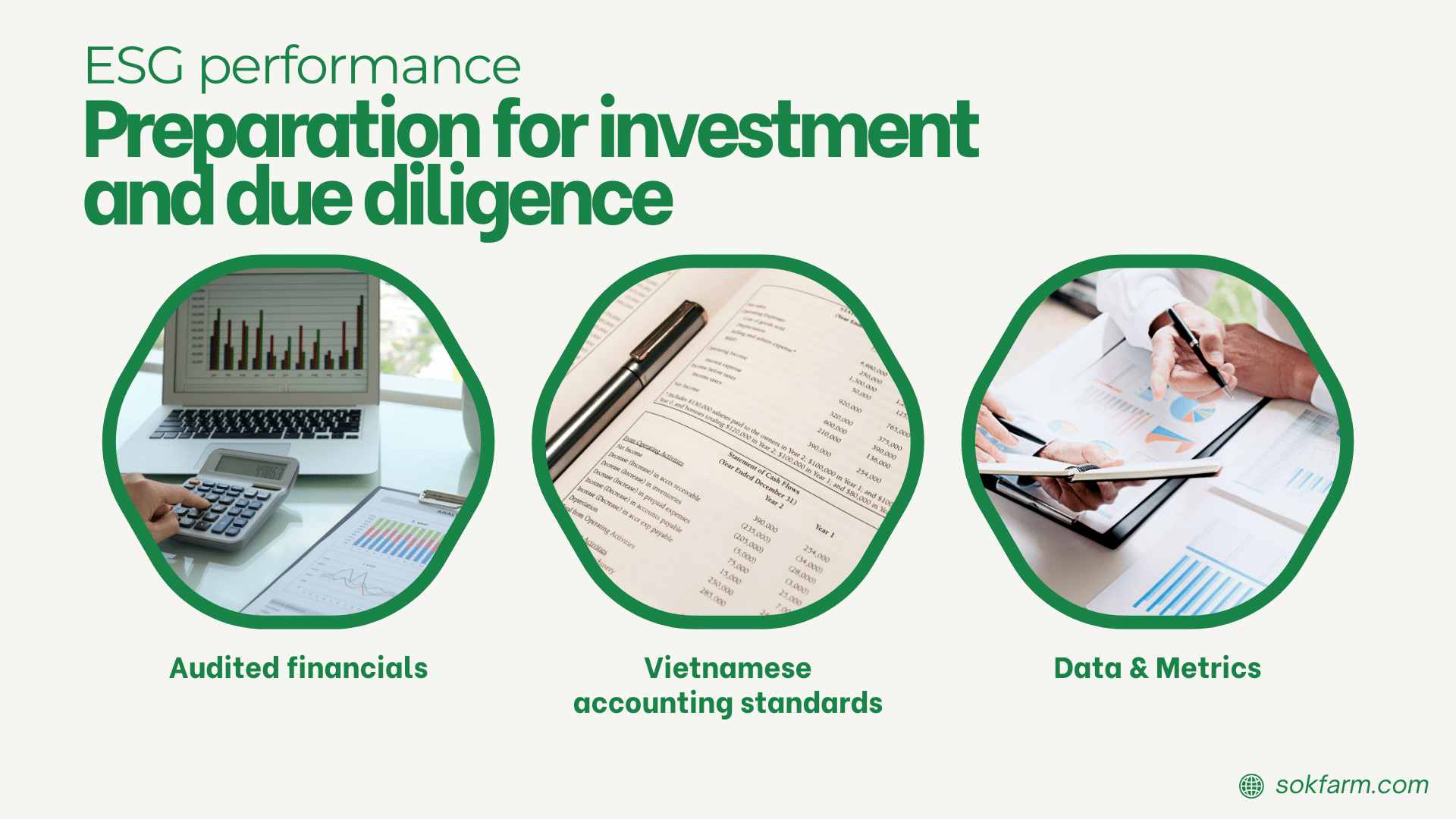
Sokfarm’s commitment to strong governance practices positions them favorably for investment and due diligence.
- Sokfarm should maintain a track record of having their financial statements audited by a reputable accounting firm. This independent verification assures investors of the accuracy and reliability of financial data.
- Sokfarm’s financial statements should adhere to recognized international financial reporting standards (IFRS) or Vietnamese accounting standards (VAS). This ensures consistency and comparability with other companies, allowing investors to make informed decisions.
- Sokfarm can compile data demonstrating the impact of their transparent procurement policies on farmer income. This data can be presented in reports or infographics to showcase their positive social impact and commitment to ethical sourcing.
- Tracking and reporting data on the increase in organic coconut nectar production area strengthens Sokfarm’s commitment to environmental responsibility. This data can include year-over-year comparisons and highlight progress towards their sustainability goals.
- Data on the number of employees who have participated in training programs, particularly those focused on sales and communication skills, showcases Sokfarm’s investment in human capital development. This can translate to increased efficiency and profitability, factors attractive to investors.
- Sokfarm can develop and publish Environmental, Social, and Governance (ESG) reports that detail their progress towards sustainability goals aligned with the UN SDGs they target. This demonstrates a commitment to responsible business practices and transparency beyond just financial performance.
3. Strategy for communicating and measuring ESG objectives
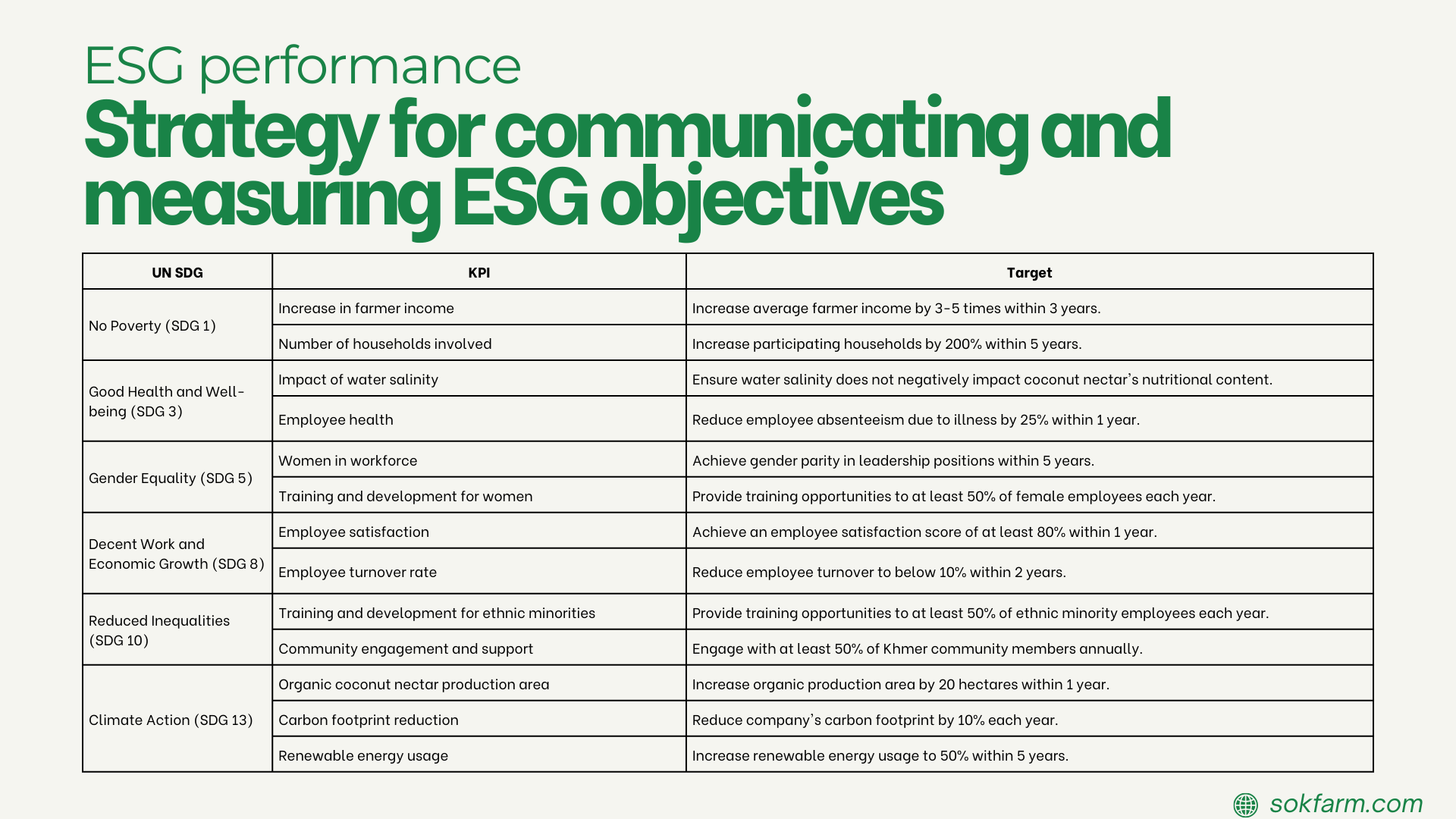
- Strategy for communicating and measuring ESG objectives
Sokfarm’s commitment to ethical, sustainable, and good governance practices (ESG) extends beyond implementation. To maximize their impact and build trust with stakeholders, Sokfarm has built a strategy for communicating and measuring our ESG objectives.
- Sokfarm can establish regular sustainability reports that detail progress on specific ESG goals aligned with the UN SDGs chosen (No Poverty, Good Health and Well-being, Reduced Inequalities, Climate Action). These reports should be easily accessible on website and shared with investors, customers, and partners.
- For each UN SDG they target, Sokfarm should establish relevant KPIs to track progress:
SDG 1: No Poverty
- Increase in farmer income:
- KPI: Average income of farmers participating in Sokfarm’s coconut nectar program compared to the average income of non-participating farmers in the region.
- Target: Increase average farmer income by 3-5 times within the next three years.
- Number of households involved in coconut nectar production:
- KPI: Total number of households participating in Sokfarm’s coconut nectar program.
- Target: Increase the number of participating households by 200% within the next five years.
SDG 3: Good Health and Well-being
- Impact of water salinity on product quality:
- KPI: Develop a system to monitor and measure water salinity levels and its impact on the nutritional value of coconut nectar.
- Target: Ensure that water salinity levels do not negatively impact the nutritional content of coconut nectar.
- Employee health:
- KPI: Implement and maintain a comprehensive occupational health.
- Target: Reduce employee absenteeism due to illness by 25% within the next year.
SDG 5: Gender Equality
- Representation of women in the workforce:
- KPI: Track the percentage of women in leadership positions and across all departments.
- Target: Achieve gender parity in leadership positions within the next five years.
- Training and development opportunities for women:
- KPI: Number of training programs specifically designed for women employees.
- Target: Provide training opportunities to at least 50% of female employees each year.
SDG 8: Decent Work and Economic Growth
- Employee satisfaction:
- KPI: Conduct regular employee satisfaction surveys to measure job satisfaction, engagement, and overall well-being.
- Target: Achieve an employee satisfaction score of at least 80% within the next year.
- Employee turnover rate:
- KPI: Track the annual employee turnover rate.
- Target: Reduce employee turnover to below 10% within the next two years.
SDG 10: Reduced Inequalities
- Training and development opportunities for ethnic minorities:
- KPI: Number of training programs specifically designed for ethnic minority employees.
- Target: Provide training opportunities to at least 50% of ethnic minority employees each year.
- Community engagement and support:
- KPI: Number of community engagement initiatives and support programs implemented for the Khmer community.
- Target: Engage with at least 50% of the Khmer community members in the region through various initiatives each year.
SDG 13: Climate Action
- Organic coconut nectar production area:
- KPI: Track the total area of organic coconut nectar production.
- Target: Increase the area of organic coconut nectar production by 20 hectares within the next year.
- Carbon footprint reduction:
- KPI: Measure and track the company’s carbon footprint annually.
- Target: Reduce the company’s carbon footprint by 10% each year.
- Renewable energy usage:
- KPI: Track the percentage of energy consumed from renewable sources.
Target: Increase the proportion of renewable energy sources to 50% within the next five years.
D. Learning curve
Learning curve

From the point of exploring pressing social issues, Sokfarm is proud to be the Vietnamese pioneer in maintaining Khmer people’s tradition of growing coconuts for honey. Through this, Sokfarm has created a multitude of environmental as well as social values. The business emphasizes organic farming methods and strives for sustainable agriculture. At the same time, it also secures farmers’ livelihoods, creates jobs for women, promotes local agricultural tourism as well as the traditional way of collecting coconut nectar of the Khmer people.
Areas for improvement

Despite aforementioned perks, there are some points that need to be improved.
Firstly, we can articulate the product and its impacts more clearly, incorporating visual aids to illustrate different components of the business as well as using dashboards or visual tools to communicate ESG performance.
Besides, Sokfarm needs to enhance the quality of machines and equipment it is using so as to better productivity whereas making the production process environmentally and human friendly.
To improve further, Sokfarm should continue to establish greater connections with various counterparts, therefore reaching different types of customers, making more powerful impacts and further addressing global issues. Through this process, we can also incorporate client and key partner testimonials, including feedback, statistics and reports, to enhance the products.
At the same time, we also need to elaborate more on our marketing campaign to show how impactful it is. This includes more details, such as specifying the steps that are involved, how we collect statistics as well as evaluate them to better the products.
